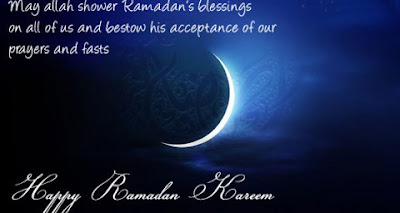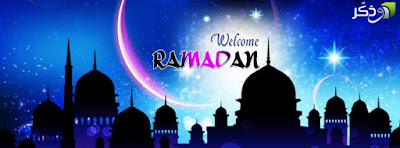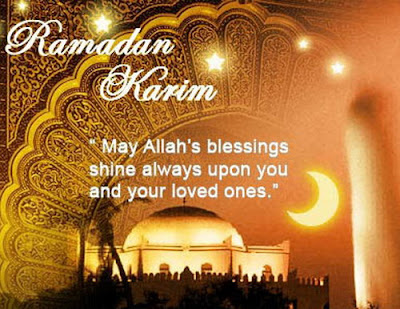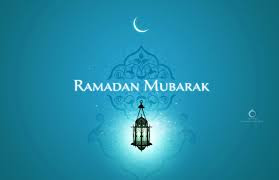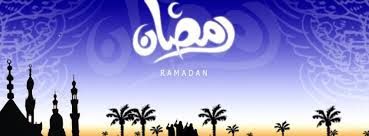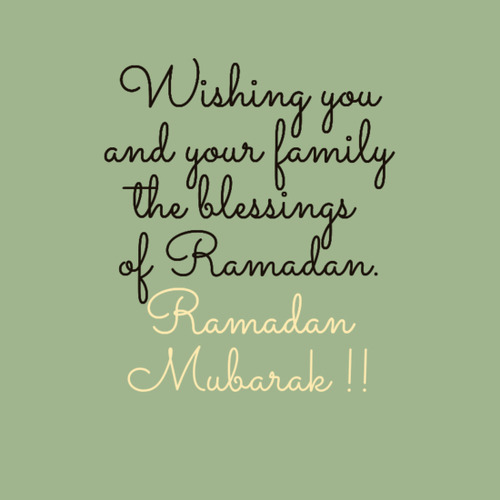That time of the year has come. A month to repent from our wrong-doings and sin. May all of us find peace on this Ramadan. Happy Ramadan Kareem!
Ramadan,ˌræməˈdɑːn,
رمضان Ramaḍān, rɑmɑˈdˤɑːn;, Ramadhan, Ramazan and Ramzan is the ninth
month of the Islamic calendar, and is observed by Muslims worldwide as a
month of fasting to commemorate the first revelation of the Quran to
Muhammad according to Islamic belief.
This annual observance is regarded as one of the Five Pillars of Islam. The month lasts 29–30 days based on the visual sightings of the crescent moon, according to numerous biographical accounts compiled in the hadiths.
ഹിജ്റ വർഷ പ്രകാരം ഒൻപതാമത്തെ മാസമാണ് റമദാൻ رمضان. ശഅബാനിന്റെയും ശവ്വാലിന്റെയും ഇടയിലുള്ള മാസം. പരിശുദ്ധ ഖുർആൻ അവതരിച്ച മാസം.
ഇസ്ലാമിക വിശ്വാസ പ്രകാരം ഏറ്റവും അനുഗൃഹീതവും പുണ്യവും ഭയഭക്തിനിർഭരവും ആത്മീയമായി വളരെ ഗുണപരവുമായ മാസമാണിത്. ഇസ്ലാമിന്റെ പഞ്ചസ്തംഭങ്ങളിൽ നാലാമത്തെതായ വ്രതാനുഷ്ഠാനം ഈ മാസത്തിലാണ്. മാസങ്ങളിൽ അല്ലാഹു ഏറ്റവും പവിത്രമാക്കിയ മാസമാണ് റമദാൻ.
The month of Ramadan is that in which was revealed the Quran; a guidance for mankind, and clear proofs of the guidance, and the criterion (of right and wrong). And whosoever of you is present, let him fast the month, and whosoever of you is sick or on a journey, a number of other days.
Allah desires for you ease; He desires not hardship for you; and that you should complete the period, and that you should magnify Allah for having guided you, and that perhaps you may be thankful.
ജനങ്ങൾക്ക് മാർഗദർശനമായിക്കൊണ്ടും,നേർവഴി കാട്ടുന്നതും സത്യവും അസത്യവും വേർതിരിച്ചു കാണിക്കുന്നതുമായ സുവ്യക്ത തെളിവുകളായിക്കൊണ്ടും വിശുദ്ധ ഖുർആൻ അവതരിപ്പിക്കപ്പെട്ട മാസമാകുന്നു റമദാൻ. അതു കൊണ്ട് നിങ്ങളിൽ ആര് ആ മാസത്തിൽ സന്നിഹിതരാണോ അവർ ആ മാസം വ്രതമനുഷ്ഠിക്കേണ്ടതാണ്. ആരെങ്കിലും രോഗിയാവുകയോ, യാത്രയിലാവുകയോ ചെയ്താൽ പകരം അത്രയും എണ്ണം (നോമ്പെടുക്കേണ്ടതാണ്.) നിങ്ങൾക്ക് ആശ്വാസം വരുത്താനാണ് അല്ലാഹു ഉദ്ദേശിക്കുന്നത്. നിങ്ങൾക്ക് ഞെരുക്കം ഉണ്ടാക്കാൻ അവൻ ഉദ്ദേശിക്കുന്നില്ല. നിങ്ങൾ ആ എണ്ണം പൂർത്തിയാക്കുവാനും, നിങ്ങൾക്ക് നേർവഴി കാണിച്ചുതന്നിന്റെപേരിൽ അല്ലാഹുവിന്റെ മഹത്ത്വം നിങ്ങൾ പ്രകീർത്തിക്കുവാനും നിങ്ങൾ നന്ദിയുള്ളവരായിരിക്കുവാനും വേണ്ടിയത്രെ (ഇങ്ങനെ കൽപിച്ചിട്ടുള്ളത്. )
The word Ramadan comes from the Arabic root ramiḍa or ar-ramaḍ, which means scorching heat or dryness. Fasting is fardh ("obligatory") for adult Muslims, except those who are suffering from an illness, travelling, are elderly, pregnant, breastfeeding, diabetic or going through menstrual bleeding. Fasting the month of Ramadan was made obligatory (wājib) during the month of Sha'aban, in the second year after the Muslims migrated from Mecca to Medina. Fatwas have been issued declaring that Muslims who live in regions with natural phenomenon such as the midnight sun or polar night should follow the timetable of Mecca.
While fasting from dawn until sunset, Muslims refrain from consuming food, drinking liquids, smoking, and engaging in sexual relations; in some interpretations, Muslims also refrain from other behavior that could be perceived as sinful, such as swearing, engaging in disagreements, backbiting and procrastination. Food and drink is served daily, before dawn and after sunset. Spiritual rewards (thawab) for fasting are also believed to be multiplied within the month of Ramadan. Fasting for Muslims during Ramadan typically includes the increased offering of salat (prayers) and recitation of the Quran
റമദാൻ മാസത്തിലെ പ്രാർഥനകൾക്കും ഖുർആൻ പാരായണത്തിനും സകാത്ത് നൽകുന്നതിനും ദാനധർമ്മങ്ങൾക്കും മറ്റ് പുണ്യകർമ്മങ്ങൾക്കും കൂടുതൽ പ്രതിഫലം ലഭിക്കുന്നതിനാൽ മുസ്ലിംങ്ങൾ എല്ലാ സൽകമ്മങ്ങളും അധികരിപ്പിക്കുന്നു. പത്തു ദിവസങ്ങൾ അടങ്ങുന്ന മൂന്ന് ഭാഗങ്ങളായി റമദാനെ തിരിച്ചിരിക്കുന്നു. ഇതിനെ റഹ്മ (ദൈവകൃപ), മഗ്ഫിറ(പാപമോചനം), നിജാദ് (നരക വിമുക്തി) എന്നിങ്ങനെ പേരു നൽകിയിരിക്കുന്നു. ഇതിനു പ്രാമാണികമായി തെളിവില്ല. എല്ലാ ദിവസവും ദൈവകൃപ, പാപമോചനം, നരക വിമുക്തി ഉണ്ടെന്നതിനാണ് കൂടുതൽ പ്രാബല്യം. അവസാന പത്തിലെ ഒറ്റയിട്ട രാവുകൾ ഏറ്റവും പുണ്യകരമായ രാവുകളാണ്. അവസാനത്തെ പത്തിലുള്ള പവിത്രമാക്കപ്പെട്ടതും ആയിരം മാസത്തേക്കാൾ പുണ്യകരവുമായ രാവാണ് ലൈലത്തുൽ ഖദ്ർ. ഖുർആൻ അവതരിപ്പിച്ചുവെന്നതാണ് ഈ രാവിന്റെ പ്രത്യേകത
The predominant practice during Ramadan is fasting from dawn to sunset. The pre-dawn meal before the fast is called the suhoor, while the meal at sunset that breaks the fast is the iftar. Considering the high diversity of the global Muslim population, it is impossible to describe typical suhoor or iftar meals. Muslims also engage in increased prayer and charity during Ramadan. Ramadan is also a month where Muslims try to practice increased self-discipline. This is motivated by the Hadith, especially in Al-Bukhari and Muslim, that "When Ramadan arrives, the gates of Paradise are opened and the gates of hell are locked up and devils are put in chains."
ഈ മാസത്തിലെ വ്രതാനുഷ്ടാനം മുസ്ലിംകൾക്ക് നിർബന്ധ ബാദ്ധ്യതയാണ്.
സൂര്യോദയം മുതൽ സൂര്യാസ്തമയം വരെ അന്നപാനീയങ്ങളും മൈഥുനാദി
വികാരപ്രകടനങ്ങളും ഉപേക്ഷിച്ച് ദൈവിക സ്മരണയിൽ കഴിഞ്ഞ് കൂടുക എന്നതാണത്.
അനാവശ്യമായ വാക്കും പ്രവർത്തികളും തർക്കങ്ങളും ഉപേക്ഷിക്കുന്നതും
നോമ്പിന്റെ താല്പര്യത്തിൽ പെട്ടതാണ്.
In the evening, dates are usually the first food to break the fast; according to tradition, Muhammad broke fast with three dates. Following that, Muslims generally adjourn for the Maghrib prayer, the fourth of the five daily prayers, after which the main meal is served. Social gatherings, many times in a buffet style, are frequent at iftar. Traditional dishes are often highlighted, including traditional desserts, and particularly those made only during Ramadan. Water is usually the beverage of choice, but juice and milk are also often available, as are soft drinks and caffeinated beverages. In the Middle East, the iftar meal consists of water, juices, dates, salads and appetizers, one or more main dishes, and various kinds of desserts. Usually, the dessert is the most important part during iftar. Typical main dishes are lamb stewed with wheat berries, lamb kebabs with grilled vegetables, or roast chicken served with chickpea-studded rice pilaf. A rich dessert, such as luqaimat, baklava or kunafeh (a buttery, syrup-sweetened kadaifi noodle pastry filled with cheese), concludes the meal. Over time, iftar has grown into banquet festivals. This is a time of fellowship with families, friends and surrounding communities, but may also occupy larger spaces at masjid or banquet halls for 100 or more diners.
റമദാനിൽ മറ്റുള്ളവരെ നോമ്പുതുറപ്പിക്കുന്നതും സംഘടിതമായി നോമ്പുതുറക്കുന്നതും പുണ്യകരമായ കാര്യമാണ്. മഗ്രിബ് ബാങ്കോടെയാണ് ഒരുദിവസത്തെ വ്രതം അവസാനിപ്പിക്കുന്നത്. ഈത്തപ്പഴമോ വെള്ളമോ കൊണ്ട് വ്രതം അവസാനിപ്പിക്കുന്നതാണ് പ്രവാചകചര്യ.
Tarawih تراويح refers to extra prayers performed by Muslims at night in the Islamic month of Ramadan. Contrary to popular belief, they are not compulsory. However, many Muslims pray these prayers in the evening during Ramadan. Some scholars maintain that Tarawih is neither fard or a Sunnah, but is the preponed Tahajjud (night prayer) prayer shifted to post-Isha' for the ease of believers. But a majority of Sunni scholars regard the Tarawih prayers as Sunnat al-Mu'akkadah, a salaat that was performed by the Islamic prophet Muhammad very consistently.
റമദാൻ മാസത്തിലും അല്ലാത്തപ്പോഴും രാത്രികളിൽ ഇശാ നിസ്ക്കാരാനന്തരം മുസ്ലിങ്ങൾ നടത്തിവരുന്ന ഒരു സുന്നത്ത് (നബിചര്യ) പ്രാർഥനയാണ് തറാവീഹ് (അറബി:تراويح).റമദാനിൽ ഇത് സംഘമായാണ് നിർവ്വഹിക്കുന്നത്. ദീർഘമായി ഖുർആൻ പാരായണം ചെയ്താണ് ഈ നമസ്കാരം നിർവ്വഹിക്കാറുള്ളത്. രണ്ട് റകഅത്തുകൾ കഴിഞ്ഞ് അല്പം വിശ്രമമെടുക്കുന്നതിനാലാണ് തറാവീഹ് അഥവാ വിശ്രമ നമസ്കാരം എന്ന് പേരുവന്നത്. മൂന്ന് റകഅത്ത് വിത്റ് ചേർത്തുകൊണ്ട് മുസ്ലിം പള്ളികളിൽ പതിനൊന്ന് റകഅത്തായും 23 റകഅത്തായും നമസ്കരിച്ച് വരുന്നു. ആയിശ(റ) യോട് ചോദിച്ചു "റമദാനിലെ അല്ലാഹുവിൻറെ റസൂൽ(സ)യുടെ നമസ്കാരം എങ്ങനെ ആയിരുന്നു? അവർ പറഞ്ഞു . റമദാനിലും അല്ലാത്തവയിലും അല്ലാഹുവിൻറെ റസൂൽ(സ) 11 റക്അത്തിൽ അധികരിപ്പിചിട്ടേയില്ല. (ബുഖാരി 1147 മുസ്ലിം 125,735) (ബുഖാരി 1123 മുസ്ലിം 736) (ബുഖാരി 1139) (ബുഖാരി 1140 മുസ്ലിം 738 ) ഉബയ്യിബ്നു കഅബിനോടും തമീമുദ്ദാരിയോടും ജനങ്ങൾക് ഇമാമായി 11 റക്അത്ത് നമസ്കരിക്കുവാൻ ഉമർ(റ) കൽപിച്ചു.(മുവത്വ- ഹദീസ് 251). ഉമർ (റ) കാലത്ത് തറാവീഹ് 20 നമസ്കരിച്ചതായും പ്രമാണങ്ങളുണ്ട്. ദീർഘസമയം നിന്ന് നമസ്കരിക്കുന്നത് ലഘൂകരിക്കുവാനായിരിക്കാം ഇങ്ങനെ മാറ്റം വരുത്തിയത്. സുന്നത്തായ കർമ്മമെന്ന നിലക്ക് എണ്ണത്തിൽ കണിശത ആവശ്യമില്ലെന്ന് പണ്ഡിതന്മാർ നിരീക്ഷിക്കുന്നു.
Charity is very important in Islam, and even more so during Ramadan. Zakāt, often translated as "the poor-rate", is obligatory as one of the pillars of Islam; a fixed percentage of the person's savings is required to be given to the poor. Sadaqah is voluntary charity in giving above and beyond what is required from the obligation of zakāt. In Islam, all good deeds are more handsomely rewarded during Ramadan than in any other month of the year. Consequently, many will choose this time to give a larger portion, if not all, of the zakāt that they are obligated to give. In addition, many will also use this time to give a larger portion of sadaqah in order to maximize the reward that will await them at the Last Judgment.
റമദാൻ നോമ്പ് അവസാനിക്കുന്നതോടെ നിർബന്ധമായിത്തീരുന്ന ധാനധർമ്മമാണ് ഫിത്ർ സകാത്ത്. പെരുന്നാൾ ദിനത്തിലാരും പട്ടിണി കിടക്കരുതെന്നും അന്നെ ദിവസം എല്ലാവരും സുഭിക്ഷമായി ഭക്ഷണം കഴിക്കണമെന്നുമാണ് ഫിത്ർ സകാത്തിന്റെ താല്പര്യം. അതിനായി പെരുന്നാൾ ദിവസത്തേക്കുള്ള ഭക്ഷണ സാധനങ്ങൾ മാറ്റിവെച്ച് ബാക്കിയുള്ളതിൽ നിന്ന് നിർബന്ധമായും ഇത് നിർവ്വഹിക്കണം. നോമ്പിലെ വീഴ്ചകൾ പൊറുക്കപ്പെടാനുള്ള കർമ്മം കൂടിയാണ് ഈ സകാത്ത്. പെരുന്നാളിന് മുമ്പായി ഇത് വീടുകളിലെത്തിയിരിക്കണം.
It has been suggested that fasting during Ramadan has numerous health benefits, including: improved brain function and alertness due to greater brain cell production; greatly reduced stress levels due to a reduction in cortisol; a reduction of cholesterol; a reduction of blood glucose LDL cholesterol levels; increases in HDL cholesterol; Weight loss due to the use of fat for energy while preserving muscle; decrease of waist circumference; decrease of body mass index; decrease of blood sugar; decrease of mean arterial pressure; better control of diabetes; reduced blood pressure; and a detoxification process.
The holiday of Eid al-Fitr عيد الفطر "festivity of breaking the fast" marks the end of Ramadan and the beginning of the next lunar month, Shawwal. This first day of the following month is declared after another crescent new moon has been sighted or the completion of 30 days of fasting if no visual sighting is possible due to weather conditions. This first day of Shawwal is called Eid al-Fitr. Eid al-Fitr may also be a reference towards the festive nature of having endured the month of fasting successfully and returning to the more natural disposition (fitra) of being able to eat, drink and resume intimacy with spouses during the day.
ഹിജ്റ വർഷം ശവ്വാൽ മാസത്തിലെ ആദ്യ ദിവസം മുസ്ലീംകൾ ആഘോഷിക്കുന്ന ആഘോഷമാണ് ഈദുൽ ഫിത്ർ. റമദാൻ വ്രതമനുഷ്ഠാനത്തിന്റെ പരിസമാപ്തികുറിച്ച് കോണ്ടാണ് ഈദുൽ ഫിത്ർ അഥവാ ചെറിയ പെരുന്നാൾ ആഘോഷിക്കപ്പെടുന്നത് . ഈദ് എന്ന അറബിക് പദത്തിന് ആഘോഷം എന്നും ഫിത്ർ എന്ന പദത്തിന് നോമ്പു തുറക്കൽ എന്നുമാണ് അർത്ഥം. അതിനാൽ റമദാൻ മാസമുടനീളം ആചരിച്ച നോമ്പിന്റെ പൂർത്തികരണത്തിനൊടുവിലുള്ള നോമ്പുതുറ എന്നതാണ് ഈദുൽ ഫിത്ർ എന്നത് പ്രതിനിധാനം ചെയ്യുന്നത്. ഈദിന്റെ (പെരുന്നാളിന്റെ) ആദ്യ ദിനം റമദാൻ കഴിഞ്ഞു വരുന്ന മാസമായ ശവ്വാൽ ഒന്നിനായിരിക്കും. പ്രസ്തുത ദിനം നോമ്പെടുക്കുന്നത് വിലക്കപ്പെട്ടിരിക്കുന്നു.
As the month of Ramadan starts, talk respectfully,
treat others kindly, walk modestly and pray sincerely.
May Allah bless you and your family.
This annual observance is regarded as one of the Five Pillars of Islam. The month lasts 29–30 days based on the visual sightings of the crescent moon, according to numerous biographical accounts compiled in the hadiths.
ഹിജ്റ വർഷ പ്രകാരം ഒൻപതാമത്തെ മാസമാണ് റമദാൻ رمضان. ശഅബാനിന്റെയും ശവ്വാലിന്റെയും ഇടയിലുള്ള മാസം. പരിശുദ്ധ ഖുർആൻ അവതരിച്ച മാസം.
ഇസ്ലാമിക വിശ്വാസ പ്രകാരം ഏറ്റവും അനുഗൃഹീതവും പുണ്യവും ഭയഭക്തിനിർഭരവും ആത്മീയമായി വളരെ ഗുണപരവുമായ മാസമാണിത്. ഇസ്ലാമിന്റെ പഞ്ചസ്തംഭങ്ങളിൽ നാലാമത്തെതായ വ്രതാനുഷ്ഠാനം ഈ മാസത്തിലാണ്. മാസങ്ങളിൽ അല്ലാഹു ഏറ്റവും പവിത്രമാക്കിയ മാസമാണ് റമദാൻ.
The month of Ramadan is that in which was revealed the Quran; a guidance for mankind, and clear proofs of the guidance, and the criterion (of right and wrong). And whosoever of you is present, let him fast the month, and whosoever of you is sick or on a journey, a number of other days.
Allah desires for you ease; He desires not hardship for you; and that you should complete the period, and that you should magnify Allah for having guided you, and that perhaps you may be thankful.
ജനങ്ങൾക്ക് മാർഗദർശനമായിക്കൊണ്ടും,നേർവഴി കാട്ടുന്നതും സത്യവും അസത്യവും വേർതിരിച്ചു കാണിക്കുന്നതുമായ സുവ്യക്ത തെളിവുകളായിക്കൊണ്ടും വിശുദ്ധ ഖുർആൻ അവതരിപ്പിക്കപ്പെട്ട മാസമാകുന്നു റമദാൻ. അതു കൊണ്ട് നിങ്ങളിൽ ആര് ആ മാസത്തിൽ സന്നിഹിതരാണോ അവർ ആ മാസം വ്രതമനുഷ്ഠിക്കേണ്ടതാണ്. ആരെങ്കിലും രോഗിയാവുകയോ, യാത്രയിലാവുകയോ ചെയ്താൽ പകരം അത്രയും എണ്ണം (നോമ്പെടുക്കേണ്ടതാണ്.) നിങ്ങൾക്ക് ആശ്വാസം വരുത്താനാണ് അല്ലാഹു ഉദ്ദേശിക്കുന്നത്. നിങ്ങൾക്ക് ഞെരുക്കം ഉണ്ടാക്കാൻ അവൻ ഉദ്ദേശിക്കുന്നില്ല. നിങ്ങൾ ആ എണ്ണം പൂർത്തിയാക്കുവാനും, നിങ്ങൾക്ക് നേർവഴി കാണിച്ചുതന്നിന്റെപേരിൽ അല്ലാഹുവിന്റെ മഹത്ത്വം നിങ്ങൾ പ്രകീർത്തിക്കുവാനും നിങ്ങൾ നന്ദിയുള്ളവരായിരിക്കുവാനും വേണ്ടിയത്രെ (ഇങ്ങനെ കൽപിച്ചിട്ടുള്ളത്. )
The word Ramadan comes from the Arabic root ramiḍa or ar-ramaḍ, which means scorching heat or dryness. Fasting is fardh ("obligatory") for adult Muslims, except those who are suffering from an illness, travelling, are elderly, pregnant, breastfeeding, diabetic or going through menstrual bleeding. Fasting the month of Ramadan was made obligatory (wājib) during the month of Sha'aban, in the second year after the Muslims migrated from Mecca to Medina. Fatwas have been issued declaring that Muslims who live in regions with natural phenomenon such as the midnight sun or polar night should follow the timetable of Mecca.
While fasting from dawn until sunset, Muslims refrain from consuming food, drinking liquids, smoking, and engaging in sexual relations; in some interpretations, Muslims also refrain from other behavior that could be perceived as sinful, such as swearing, engaging in disagreements, backbiting and procrastination. Food and drink is served daily, before dawn and after sunset. Spiritual rewards (thawab) for fasting are also believed to be multiplied within the month of Ramadan. Fasting for Muslims during Ramadan typically includes the increased offering of salat (prayers) and recitation of the Quran
റമദാൻ മാസത്തിലെ പ്രാർഥനകൾക്കും ഖുർആൻ പാരായണത്തിനും സകാത്ത് നൽകുന്നതിനും ദാനധർമ്മങ്ങൾക്കും മറ്റ് പുണ്യകർമ്മങ്ങൾക്കും കൂടുതൽ പ്രതിഫലം ലഭിക്കുന്നതിനാൽ മുസ്ലിംങ്ങൾ എല്ലാ സൽകമ്മങ്ങളും അധികരിപ്പിക്കുന്നു. പത്തു ദിവസങ്ങൾ അടങ്ങുന്ന മൂന്ന് ഭാഗങ്ങളായി റമദാനെ തിരിച്ചിരിക്കുന്നു. ഇതിനെ റഹ്മ (ദൈവകൃപ), മഗ്ഫിറ(പാപമോചനം), നിജാദ് (നരക വിമുക്തി) എന്നിങ്ങനെ പേരു നൽകിയിരിക്കുന്നു. ഇതിനു പ്രാമാണികമായി തെളിവില്ല. എല്ലാ ദിവസവും ദൈവകൃപ, പാപമോചനം, നരക വിമുക്തി ഉണ്ടെന്നതിനാണ് കൂടുതൽ പ്രാബല്യം. അവസാന പത്തിലെ ഒറ്റയിട്ട രാവുകൾ ഏറ്റവും പുണ്യകരമായ രാവുകളാണ്. അവസാനത്തെ പത്തിലുള്ള പവിത്രമാക്കപ്പെട്ടതും ആയിരം മാസത്തേക്കാൾ പുണ്യകരവുമായ രാവാണ് ലൈലത്തുൽ ഖദ്ർ. ഖുർആൻ അവതരിപ്പിച്ചുവെന്നതാണ് ഈ രാവിന്റെ പ്രത്യേകത
Ramadan Religious practices
The predominant practice during Ramadan is fasting from dawn to sunset. The pre-dawn meal before the fast is called the suhoor, while the meal at sunset that breaks the fast is the iftar. Considering the high diversity of the global Muslim population, it is impossible to describe typical suhoor or iftar meals. Muslims also engage in increased prayer and charity during Ramadan. Ramadan is also a month where Muslims try to practice increased self-discipline. This is motivated by the Hadith, especially in Al-Bukhari and Muslim, that "When Ramadan arrives, the gates of Paradise are opened and the gates of hell are locked up and devils are put in chains."
Ramadan Iftar
In the evening, dates are usually the first food to break the fast; according to tradition, Muhammad broke fast with three dates. Following that, Muslims generally adjourn for the Maghrib prayer, the fourth of the five daily prayers, after which the main meal is served. Social gatherings, many times in a buffet style, are frequent at iftar. Traditional dishes are often highlighted, including traditional desserts, and particularly those made only during Ramadan. Water is usually the beverage of choice, but juice and milk are also often available, as are soft drinks and caffeinated beverages. In the Middle East, the iftar meal consists of water, juices, dates, salads and appetizers, one or more main dishes, and various kinds of desserts. Usually, the dessert is the most important part during iftar. Typical main dishes are lamb stewed with wheat berries, lamb kebabs with grilled vegetables, or roast chicken served with chickpea-studded rice pilaf. A rich dessert, such as luqaimat, baklava or kunafeh (a buttery, syrup-sweetened kadaifi noodle pastry filled with cheese), concludes the meal. Over time, iftar has grown into banquet festivals. This is a time of fellowship with families, friends and surrounding communities, but may also occupy larger spaces at masjid or banquet halls for 100 or more diners.
റമദാനിൽ മറ്റുള്ളവരെ നോമ്പുതുറപ്പിക്കുന്നതും സംഘടിതമായി നോമ്പുതുറക്കുന്നതും പുണ്യകരമായ കാര്യമാണ്. മഗ്രിബ് ബാങ്കോടെയാണ് ഒരുദിവസത്തെ വ്രതം അവസാനിപ്പിക്കുന്നത്. ഈത്തപ്പഴമോ വെള്ളമോ കൊണ്ട് വ്രതം അവസാനിപ്പിക്കുന്നതാണ് പ്രവാചകചര്യ.
Ramadan Nightly Prayers Tarawih
Tarawih تراويح refers to extra prayers performed by Muslims at night in the Islamic month of Ramadan. Contrary to popular belief, they are not compulsory. However, many Muslims pray these prayers in the evening during Ramadan. Some scholars maintain that Tarawih is neither fard or a Sunnah, but is the preponed Tahajjud (night prayer) prayer shifted to post-Isha' for the ease of believers. But a majority of Sunni scholars regard the Tarawih prayers as Sunnat al-Mu'akkadah, a salaat that was performed by the Islamic prophet Muhammad very consistently.
റമദാൻ മാസത്തിലും അല്ലാത്തപ്പോഴും രാത്രികളിൽ ഇശാ നിസ്ക്കാരാനന്തരം മുസ്ലിങ്ങൾ നടത്തിവരുന്ന ഒരു സുന്നത്ത് (നബിചര്യ) പ്രാർഥനയാണ് തറാവീഹ് (അറബി:تراويح).റമദാനിൽ ഇത് സംഘമായാണ് നിർവ്വഹിക്കുന്നത്. ദീർഘമായി ഖുർആൻ പാരായണം ചെയ്താണ് ഈ നമസ്കാരം നിർവ്വഹിക്കാറുള്ളത്. രണ്ട് റകഅത്തുകൾ കഴിഞ്ഞ് അല്പം വിശ്രമമെടുക്കുന്നതിനാലാണ് തറാവീഹ് അഥവാ വിശ്രമ നമസ്കാരം എന്ന് പേരുവന്നത്. മൂന്ന് റകഅത്ത് വിത്റ് ചേർത്തുകൊണ്ട് മുസ്ലിം പള്ളികളിൽ പതിനൊന്ന് റകഅത്തായും 23 റകഅത്തായും നമസ്കരിച്ച് വരുന്നു. ആയിശ(റ) യോട് ചോദിച്ചു "റമദാനിലെ അല്ലാഹുവിൻറെ റസൂൽ(സ)യുടെ നമസ്കാരം എങ്ങനെ ആയിരുന്നു? അവർ പറഞ്ഞു . റമദാനിലും അല്ലാത്തവയിലും അല്ലാഹുവിൻറെ റസൂൽ(സ) 11 റക്അത്തിൽ അധികരിപ്പിചിട്ടേയില്ല. (ബുഖാരി 1147 മുസ്ലിം 125,735) (ബുഖാരി 1123 മുസ്ലിം 736) (ബുഖാരി 1139) (ബുഖാരി 1140 മുസ്ലിം 738 ) ഉബയ്യിബ്നു കഅബിനോടും തമീമുദ്ദാരിയോടും ജനങ്ങൾക് ഇമാമായി 11 റക്അത്ത് നമസ്കരിക്കുവാൻ ഉമർ(റ) കൽപിച്ചു.(മുവത്വ- ഹദീസ് 251). ഉമർ (റ) കാലത്ത് തറാവീഹ് 20 നമസ്കരിച്ചതായും പ്രമാണങ്ങളുണ്ട്. ദീർഘസമയം നിന്ന് നമസ്കരിക്കുന്നത് ലഘൂകരിക്കുവാനായിരിക്കാം ഇങ്ങനെ മാറ്റം വരുത്തിയത്. സുന്നത്തായ കർമ്മമെന്ന നിലക്ക് എണ്ണത്തിൽ കണിശത ആവശ്യമില്ലെന്ന് പണ്ഡിതന്മാർ നിരീക്ഷിക്കുന്നു.
Ramadan Charity Zakāt Sadaqah
Charity is very important in Islam, and even more so during Ramadan. Zakāt, often translated as "the poor-rate", is obligatory as one of the pillars of Islam; a fixed percentage of the person's savings is required to be given to the poor. Sadaqah is voluntary charity in giving above and beyond what is required from the obligation of zakāt. In Islam, all good deeds are more handsomely rewarded during Ramadan than in any other month of the year. Consequently, many will choose this time to give a larger portion, if not all, of the zakāt that they are obligated to give. In addition, many will also use this time to give a larger portion of sadaqah in order to maximize the reward that will await them at the Last Judgment.
റമദാൻ നോമ്പ് അവസാനിക്കുന്നതോടെ നിർബന്ധമായിത്തീരുന്ന ധാനധർമ്മമാണ് ഫിത്ർ സകാത്ത്. പെരുന്നാൾ ദിനത്തിലാരും പട്ടിണി കിടക്കരുതെന്നും അന്നെ ദിവസം എല്ലാവരും സുഭിക്ഷമായി ഭക്ഷണം കഴിക്കണമെന്നുമാണ് ഫിത്ർ സകാത്തിന്റെ താല്പര്യം. അതിനായി പെരുന്നാൾ ദിവസത്തേക്കുള്ള ഭക്ഷണ സാധനങ്ങൾ മാറ്റിവെച്ച് ബാക്കിയുള്ളതിൽ നിന്ന് നിർബന്ധമായും ഇത് നിർവ്വഹിക്കണം. നോമ്പിലെ വീഴ്ചകൾ പൊറുക്കപ്പെടാനുള്ള കർമ്മം കൂടിയാണ് ഈ സകാത്ത്. പെരുന്നാളിന് മുമ്പായി ഇത് വീടുകളിലെത്തിയിരിക്കണം.
Ramadan Health Benefits
It has been suggested that fasting during Ramadan has numerous health benefits, including: improved brain function and alertness due to greater brain cell production; greatly reduced stress levels due to a reduction in cortisol; a reduction of cholesterol; a reduction of blood glucose LDL cholesterol levels; increases in HDL cholesterol; Weight loss due to the use of fat for energy while preserving muscle; decrease of waist circumference; decrease of body mass index; decrease of blood sugar; decrease of mean arterial pressure; better control of diabetes; reduced blood pressure; and a detoxification process.
End of Ramadan Days Eid al-Fitr ഈദുൽ ഫിത്ർ
The holiday of Eid al-Fitr عيد الفطر "festivity of breaking the fast" marks the end of Ramadan and the beginning of the next lunar month, Shawwal. This first day of the following month is declared after another crescent new moon has been sighted or the completion of 30 days of fasting if no visual sighting is possible due to weather conditions. This first day of Shawwal is called Eid al-Fitr. Eid al-Fitr may also be a reference towards the festive nature of having endured the month of fasting successfully and returning to the more natural disposition (fitra) of being able to eat, drink and resume intimacy with spouses during the day.
ഹിജ്റ വർഷം ശവ്വാൽ മാസത്തിലെ ആദ്യ ദിവസം മുസ്ലീംകൾ ആഘോഷിക്കുന്ന ആഘോഷമാണ് ഈദുൽ ഫിത്ർ. റമദാൻ വ്രതമനുഷ്ഠാനത്തിന്റെ പരിസമാപ്തികുറിച്ച് കോണ്ടാണ് ഈദുൽ ഫിത്ർ അഥവാ ചെറിയ പെരുന്നാൾ ആഘോഷിക്കപ്പെടുന്നത് . ഈദ് എന്ന അറബിക് പദത്തിന് ആഘോഷം എന്നും ഫിത്ർ എന്ന പദത്തിന് നോമ്പു തുറക്കൽ എന്നുമാണ് അർത്ഥം. അതിനാൽ റമദാൻ മാസമുടനീളം ആചരിച്ച നോമ്പിന്റെ പൂർത്തികരണത്തിനൊടുവിലുള്ള നോമ്പുതുറ എന്നതാണ് ഈദുൽ ഫിത്ർ എന്നത് പ്രതിനിധാനം ചെയ്യുന്നത്. ഈദിന്റെ (പെരുന്നാളിന്റെ) ആദ്യ ദിനം റമദാൻ കഴിഞ്ഞു വരുന്ന മാസമായ ശവ്വാൽ ഒന്നിനായിരിക്കും. പ്രസ്തുത ദിനം നോമ്പെടുക്കുന്നത് വിലക്കപ്പെട്ടിരിക്കുന്നു.
Ramadan Greetings Wishes
That time of the year has come. A month to repent from our wrong-doings and sin. May all of us find peace on this Ramadan. Happy Ramadan Kareem!
Greetings Cards Ramadan
May the divine Allah bless you with peaceful and prosperous life throughout the year. Happy Ramadan!
Ramadan 2015 Wishes
I hope you will achieve the purification of the soul
upon commemorating the month of Ramadan.
Wishing you a blessed and happy Ramadan!
upon commemorating the month of Ramadan.
Wishing you a blessed and happy Ramadan!
Ramadan SMS
Chand Raat Mubarak to Every 1 smile emoticon New dresses, Colourful
Bangles, Mehndi Designx on handx lov All d traditions of Eid ul fitar .
As the month of Ramadan starts, talk respectfully,
treat others kindly, walk modestly and pray sincerely.
May Allah bless you and your family.
Ramadan Facebook Messages
May Allah’s immaculate grace and exceptional wisdom
conquer your life as you celebrate this holy month of Ramadan. Have a blessed and peaceful Ramadan!
conquer your life as you celebrate this holy month of Ramadan. Have a blessed and peaceful Ramadan!
Ramadan WhatsApp Messages SMS
May the Spirit of Ramadan stay in our heart and
illuminate our soul from within. Happy Ramadan!
illuminate our soul from within. Happy Ramadan!
Ramadan Wallpaper Quotes SMS
Welcome the month of Ramadan with the heart filled with peace,
harmony and joy. May the divine blessings of Allah protect and guide you.
harmony and joy. May the divine blessings of Allah protect and guide you.


